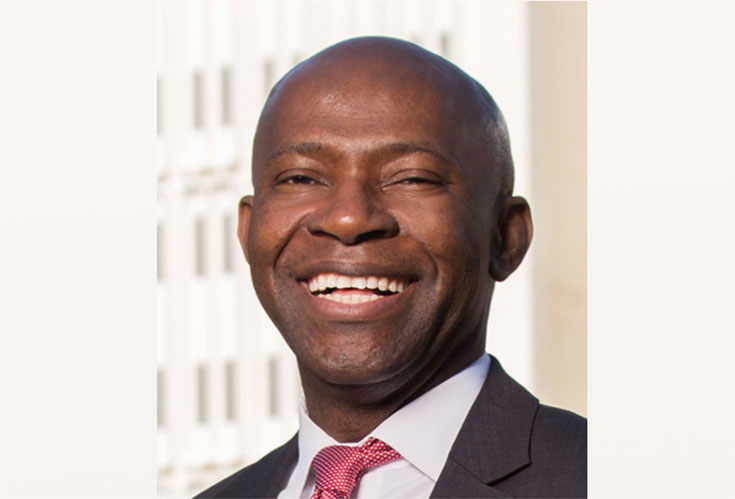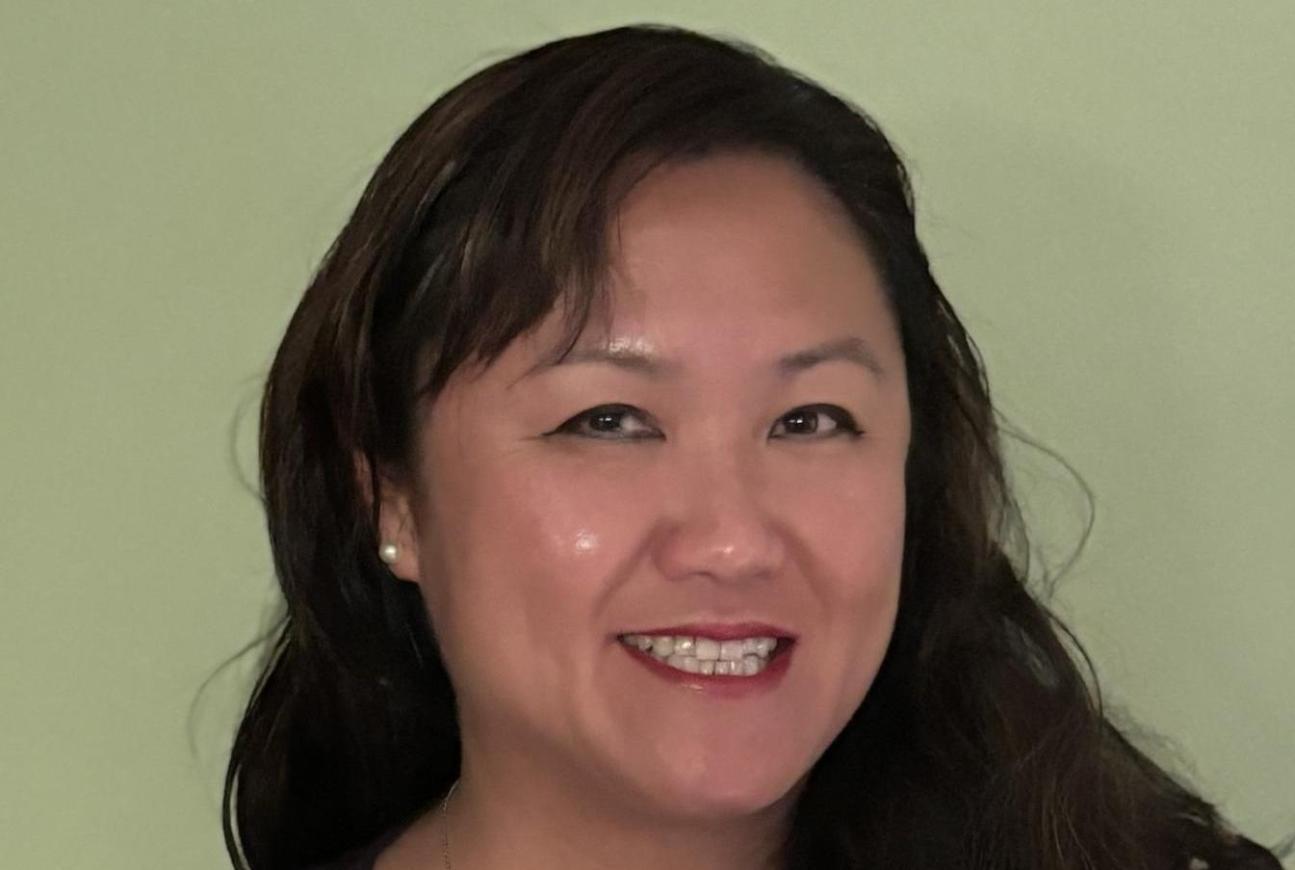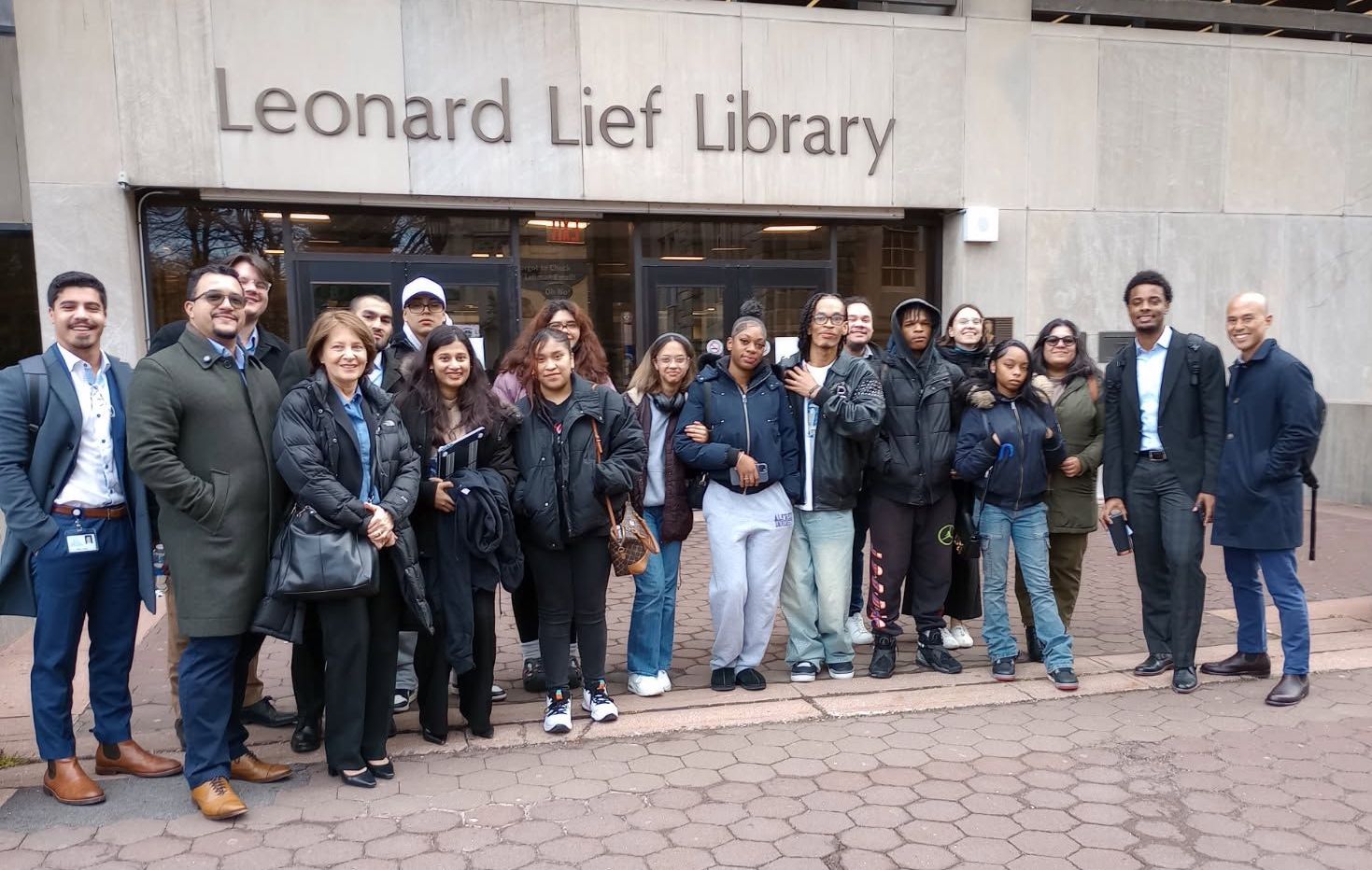- Lehman College >
- News >
- 2018 >
- President Cruz Announces Recommendation of Dr. Peter O. Nwosu as New Lehman Provost
News
Search All News
Saturday, December 13, 2025
CONTACT
Office Hours
Monday - Friday 9am - 5pmClosed Sat. and Sun.
RELATED STORIES
December 10, 2025
Tammy Lee Christensen Takes National Leadership Role in APHA
President Cruz Announces Recommendation of Dr. Peter O. Nwosu as New Lehman Provost

Peter O. Nwosu, Ph.D.
December 18, 2018
President José Luis Cruz today announced that he has recommended the appointment of Peter O. Nwosu, Ph.D. to the role of provost and senior vice president of academic affairs and student success at Lehman College of The City University of New York, effective spring 2019.
Dr. Nwosu, an American Council on Education Fellow and Fulbright Scholar, is a nationally recognized academic leader whose impactful experience includes the collaborative design, development, and implementation of initiatives ranging from curricular modernization and innovation, to guiding faculty and staff development, expanding opportunities for faculty and student research and creative activities, aligning academic and student life, fostering strategic partnerships, and improving student success outcomes (access, learning, retention, graduation, and post-graduate experiences).
“I am confident that the depth and breadth of his experience, unwavering commitment to student, faculty, and staff success, and distinguished record of scholarship, teaching and service will serve Lehman well as we work to advance our important and ambitious institutional mission,” President Cruz stated. “I know Dr. Nwosu will add much value to our determined community of teachers, scholars, learners, advocates, and activists as we work to meet our 90x30 challenge.”
“To become part of a senior college that has shaped the Bronx community for more than 50 years and served as a site for the initial meetings of the United Nations Security Council is an honor,” Dr. Nwosu said. “I welcome the opportunity to work with faculty, staff, students and administration to honor the college’s proud traditions and strengthen its regional, national and global leadership.”
About Dr. Peter O. Nwosu
Dr. Nwosu currently serves as provost and executive vice president for Academic Affairs at Clark Atlanta University (CAU), an HBCU that has been ranked as the leader in economic mobility among Atlanta-area colleges and universities. At CAU, he leads strategic and operational initiatives for the divisions of Academic Affairs and Student Affairs, a portfolio that includes four academic schools; planning, assessment, and institutional research; enrollment services; student services and campus life; research and sponsored programs; center for undergraduate research and creative activity; university honors and scholars’ program; and career development center, among others.
During his tenure at CAU, Dr. Nwosu was one of 32 provosts and chief academic officers selected from a national competition to participate in the Digital Fellows Program, an initiative supported by the Bill and Melinda Gates Foundation. The program aimed to provide provosts and chief academic officers the critical information, tested strategies and resources to help participants leverage digital technology on their campuses.
According to Dr. Kenneth C. Green, who leads the program: “Under Peter’s leadership, CAU had some of the most ambitious projects among the group. He is thoughtful and reflective. He’s eager to hear other perspectives. He’s open to new ideas and suggestions to tailor what works and make it appropriate and responsive to the context of a specific campus. He understands the importance of context.”
Prior to his appointment at CAU, Dr. Nwosu served as associate vice president for Academic Programs and accreditation liaison officer at California State University, Fullerton (CSUF), where he led the revitalization of academic assessment processes and the implementation of a student success approach that has garnered national recognition. The National Academic Advising Association selected CSUF in 2016 to receive its Outstanding Institutional Advising Program Award for “innovative and/or exemplary practices” that make “significant contributions to the improvement of academic advising.”
Before his appointment to CSUF, Dr. Nwosu was associate vice president for Academic Affairs, Institutional Planning and Assessment at Tennessee State University (TSU) in Nashville, where he led the development of a campus-wide assessment program, the implementation of the university’s strategic plan, the creation of new degree programs, and the coordination of a successful institutional reaccreditation process.
Dr. Nwosu, is a recognized expert in intercultural and international communication, diversity training, strategic planning, assessment, program evaluation and educational effectiveness. He is the author of three books and more than 90 scholarly writings including refereed journal papers, training manuals, and conference presentations and he is on the editorial board of a number of peer-reviewed journals.
Dr. Nwosu currently serves on the Executive Board of the American Council on Education Fellows Program, the Board of Directors of the California Urban Partnership, and the Board of Directors of the national Association of Chief Academic Officers.
A native of Nigeria, Dr. Nwosu earned his B.A. degree in mass communication and journalism there, from the Institute of Management and Technology in Enugu. He received his M.A. degree from Towson University near Baltimore, MD.; and a Ph.D. in communications studies from Howard University in Washington, D.C. He is also a graduate of the Institute of Higher Education at Harvard University
A Commitment Shaped in the Classroom
Dr. Nwosu began his career in higher education as a faculty member at the California State University, Sacramento. “My time in the classroom as a faculty member was instrumental in my becoming an academic leader, and today it still fuels my passion for what I do.” He said that some students he taught two decades ago are still in touch with him. “We’re not just faculty, we’re counselors,” he said. “That’s why I feel privileged to join a campus community that seeks to ‘educate, engage and empower’ its students.”
During his visit to the Lehman campus in November, Dr. Nwosu met with student leaders. He called the meeting “the highlight of my day,” but added that the group asked some very challenging questions. “It was clear that they had done their homework,” he said. The students’ commitment to Lehman resonated with him. “They said they felt at home at Lehman,” he said. “It was very encouraging to hear that they felt supported by the institution.”
In all of his academic leadership positions, Dr. Nwosu said he maintained an open-door policy for students, and meets regularly with student leadership, a practice he intends to continue at Lehman. “Helping student scholars become change agents is very compelling,” he said.
Several of Dr. Nwosu’s colleagues confirmed his determination to build systems and processes that help students succeed. Dr. Eric Mintz, professor of Chemistry at CAU, said Dr. Nwosu “has studied and improved every aspect of a student’s experience at this institution.”
Dr. Sandra Pérez, director of the honors program at CSUF, reported to Dr. Nwosu during his tenure there. “All of his work was to make sure that the systems and structures served students. He always said, ‘Let’s improve, let’s solve, let’s make it better.’”
Collaboration with Faculty “Is Peter’s Stock-In-Trade”
In recounting his leadership trajectory, Dr. Nwosu is quick to share credit with his faculty colleagues. For example, the speed with which CAU was able to initiate online degree programs and course redesign, he said, was due to the faculty invited to work on development and implementation. “The most productive thing you can do is engage faculty. They have the answers,” he said. The fully online degree program in higher education leadership was launched this fall and attracts students beyond the state of Georgia. The course redesign initiative began with three pilot courses last spring, and has scaled to 15 courses, impacting nearly 1,000 students.
“Peter brings to Lehman College a dogged determination for success. He believes that higher education is not buildings or computers, its people helping people so that they can, in turn, go out and help others,” Dr. Ronald Johnson, former president of Clark Atlanta University, stated. “You have a superior asset in Peter.”
Dr. Johnson also said Dr. Nwosu’s success as a leader was due to his ability to engage faculty. “Peter was able to get things done by pulling together teams of people with the right talents,” he said. “Collaboration with faculty is Peter’s stock-in-trade.”
Dr. Charles Dickens, who worked with Dr. Nwosu in developing and implementing TSU’s assessment program, said Dr. Nwosu was able to engage faculty by “listening well, not just on the surface, but in depth.” Dr. Mintz of CAU said Dr. Nwosu was adept at ensuring that faculty had the resources they needed to do their jobs. “He is a full believer in shared governance and responsibility.”
Dr. Michele Mouttapa, who Dr. Nwosu hired to direct the Health Professions Advising Office at CSUF, put it this way: “He’s not afraid to stick his neck out for you, but at the same time, he’ll tell you if something needs to change.”
Reacting to these testimonials, President Cruz indicated that he was not surprised. “I’ve been privileged to work with Dr. Nwosu in the past and can attest to the effectiveness of the sincere, thoughtful and purposeful way in which he engages campus stakeholders in the pursuit of institutional goals.”
Using Data to Start a Conversation
Dr. Nwosu is regarded as a “systems thinker” who turns to qualitative and quantitative data to ignite and inform wide-ranging discussions on how to improve student progress and institutional effectiveness. He has worked with faculty and staff to reduce course bottlenecks, improve pass rates for gateway courses, and reduce time to degree, all by presenting relevant data to teams of faculty and staff. “Data start the discussion about where we want to go, and what we need to get there,” he said.
Dr. Pérez at CSUF said she was hesitant about how useful data could be in her work until Dr. Nwosu convinced her otherwise. “Knowing where you are makes it easier to set concrete goals,” she said.
Dr. Mouttapa said she considers him a mentor who introduced the use of data as an accountability tool. “Suddenly, we had to show evidence of success, which made us want to do better,” she said.
Innovating with Limited Resources
In all of the leadership roles Dr. Nwosu has taken on, he has had to face the challenge of initiating new programs and services within the constraints of very limited resources.
According to Dr. Mintz at CAU, Dr. Nwosu strengthened the university’s research programs by enlisting senior faculty to serve as mentors to help junior professors get their research off the ground.
“Limited resources defines TSU,” said Dr. Dickens, who added that Dr. Nwosu “deployed people in creative and strategic ways to achieve results.”
Dr. Dickens’ colleague at TSU, Dr. Marie Hammond, was teaching a doctoral-level course in program evaluation when Dr. Nwosu made an unusual offer. “He allowed us to treat him as a client,” and Dr. Hammond’s students developed survey instruments, gathered and analyzed data. This was the genesis of Dr. Nwosu’s campus-wide assessment program, which he refined and introduced to other campuses.
“This partnership gave my students, many of whom were seeking careers in higher education, an experience they never would have had,” Dr. Hammond said. “Peter helped them professionally by enlisting them for this work.”
Dr. Nwosu is keenly aware that students also must cope with limited resources, which is why CAU’s bookstore will start bundling books in the fall of 2019. Students will pay a flat fee for all of their textbooks, at a substantial savings, an innovation Dr. Nwosu championed and initiated. “Making sure our students have the tools to learn is key,” he said.
A National Search
The search committee was led by co-chairs Dr. Anne Rice, assistant professor, Department of African and African American Studies and chair of the Executive Committee of the General Faculty, and Ron Bergmann, vice president for Information Technology and Chief Information Officer.
Professor Rice said, “Our search committee, with representation from across the campus, offered valuable perspectives and analyses throughout the process. Their thoughtful deliberations demonstrated what’s best about Lehman: integrity, honest reflection, kindness, and a deep sense of mission. We are grateful for their hard work.”
Vice President Bergmann added, “The committee worked diligently through the semester, having received more than 150 applications in a national search for this important position. The committee reviewed nearly 50 qualified, diverse applications in-depth and held video interviews with ten leading candidates. The committee then invited the four most qualified candidates for day-long meetings with the Lehman community. We offer our thanks to the committee and to the Lehman community for their active participation in this process.”
Other committee members were Stanley Bazile, dean of Student Affairs; Althea Forde, director of Instructional Support Services, Division of Enrollment Management; Jonathan Gagliardi, assistant vice president for Strategy, Policy and Analytics, Office of the President; Daisy Flores, student and president, Lehman College Student Government Association; Pamela Hinden, director, Adult Degree Program, School of Continuing and Professional Studies; Paula Loscocco, professor and chair, Department of English, School of Arts and Humanities; Pamela Mills, interim dean, School of Natural and Social Sciences and professor of Chemistry; Rosa Rivera-McCutchen, associate professor, Graduate Program in Educational Leadership, School of Education; and, Bradley Schoenfeld, assistant professor, Exercise Sciences, School of Health Sciences, Human Services and Nursing.









